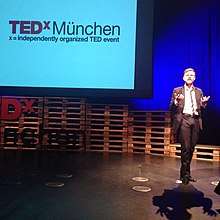Markus Gabriel
Markus Gabriel (German: [ˈɡaːbʁiˌeːl]; born April 6, 1980) is a German philosopher and author at the University of Bonn. In addition to his more specialized work, he has also written popular books about philosophical issues.
Markus Gabriel | |
|---|---|
 | |
| Born | April 6, 1980 |
| Alma mater | Heidelberg University |
| Era | 21st-century philosophy |
| Region | Western philosophy |
Career
Gabriel was educated in philosophy and Ancient Greek in Germany. After completing his doctorate and habilitation at Heidelberg University, he held a faculty position at New School for Social Research. He then came to the University of Bonn, where he holds the Chair for Epistemology, Modern and Contemporary Philosophy and is Director of the International Centre for Philosophy.[1] Gabriel has also been a visiting professor at University of California, Berkeley.[2]
Philosophy
In 2013, Gabriel wrote Transcendental Ontology: Essays in German Idealism. In the Notre Dame Philosophical Reviews Sebastian Gardner wrote that the work is "Gabriel's most comprehensive presentation to date, in English, of his reading of German Idealism"[3] and notes that "due to its compression of a wealth of ideas into such a short space, the book demands quite a lot from its readers."[3]
In a 2018 interview, Gabriel complained that "most contemporary metaphysicians are [sloppy] when it comes to characterizing their subject matter," using words like "the world" and "reality" "often...interchangeably and without further clarifications. In my view, those totality of words do not refer to anything which is capable of having the property of existence."[4] He goes on to explain:
- I try to revive the tradition of metaontology and metametaphysics that departs from Kant. As has been noticed, Heidegger introduced the term metaontology and he also clearly states that Kant’s philosophy is a “metaphysics about metaphysics.” I call metametaphysical nihilism the view that there is no such thing as the world such that questions regarding its ultimate nature, essence, structure, composition, categorical outlines etc. are devoid of the intended conceptual content. The idea that there is a big thing comprising absolutely everything is an illusion, albeit neither a natural one nor an inevitable feature of reason as such. Of course, there is an influential Neo-Carnapian strand in the contemporary debate which comes to similar conclusions. I agree with a lot of what is going on in this area of research and I try to combine it with the metaontological/metametaphysical tradition of Kantian and Post-Kantian philosophy.[4]
In an April 2020 interview he called European measures against COVID 19 unjustified and a step towards cyber dictatorship, saying the use of health apps was a Chinese or North Korean strategy. He said the coronavirus crisis called into question the idea that only scientific and technical progress could lead to human and moral progress. He said there was a paradox of virocracy, to save lives one replaced democracy by virocracy.[5]
Bibliography
- Der Mensch im Mythos: Untersuchungen über Ontotheologie, Anthropologie und Selbstbewusstseinsgeschichte in Schellings „Philosophie der Mythologie“. Walter de Gruyter, 2006 (ISBN 978-3-11-019036-6).
- An den Grenzen der Erkenntnistheorie. Die notwendige Endlichkeit des objektiven Wissens als Lektion des Skeptizismus. Karl Alber, 2008 (ISBN 978-3-495-48318-3).
- Antike und moderne Skepsis zur Einführung. Junius, Hamburg 2008, ISBN 3-88506-649-1.
- Mythology, Madness, and Laughter: Subjectivity in German Idealism (with Slavoj Žižek). Continuum, 2009.
- Skeptizismus und Idealismus in der Antike. Suhrkamp, 2009 (ISBN 978-3-518-29519-9).
- Die Erkenntnis der Welt. Eine Einführung in die Erkenntnistheorie. Karl Alber, Freiburg i. Br./München 2012. ISBN 978-3-495-48522-4.
- Warum es die Welt nicht gibt. Ullstein, Berlin 2013, ISBN 978-3-550-08010-4. (Why the World does not Exist, Polity Press, 2015, ISBN 9780745687568)
- Fields of Sense: A New Realist Ontology. Edinburgh University Press, 2015 ISBN 978-0-7486-9289-7.
- I am Not a Brain: Philosophy of Mind for the 21st Century. Polity Press, 2017 (ISBN 9781509514755).
- Neo-Existentialism. Polity Press, 2018 (ISBN 9781509532476).
References
- "Prof. Dr. Markus Gabriel". Freiburg Institute for Advanced Studies. Retrieved March 1, 2014.
- "Markus Gabriel's Courses". University of California, Berkeley. Retrieved March 1, 2014.
- Gardner, Sebastian. "Transcendental Ontology: Essays in German Idealism (review)". Notre Dame Philosophical Reviews. Retrieved March 1, 2014.
- "Interview at 3AM Magazine". Archived from the original on 2018-10-16. Retrieved 2015-07-13.
- "28 Minuten - Europa gegen das Virus". ARTE TV (in German). 2020-04-08. Retrieved 2020-04-11.